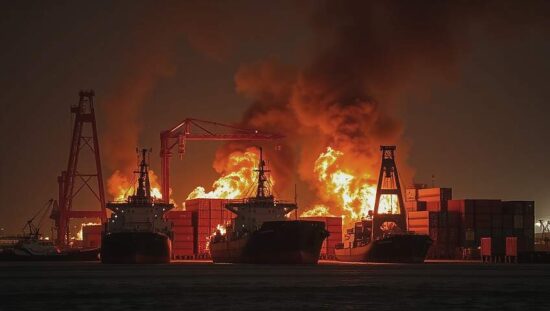The United States under Donald Trump is embarking on a revolution that not only aims to transform the country from within, but also to change its place in the world. Trump’s declaration of a total trade war against the entire world is a means to an end – to strengthen the US economy, rejuvenate its infrastructure and revitalize its industry. Trump’s goal is to make “America great again” even if it means disrupting the global order.
Regardless of whether Trump’s revolution is a success or a failure, the world will never be the same. The current phase of globalization has reached a crossroads and its process can either regress, pause, or even accelerate. The old order has collapsed and a new one is being formed under particularly turbulent conditions.
As the world economies experience a recession comparable to the start of the pandemic or the 2008 global financial crisis, pessimistic sentiments prevail. Even some of Trump’s supporters among US billionaires suggest taking a break from what they call a “economic nuclear war against the whole world.” However, Trump will not back down – the dice have been cast and the Rubicon has been crossed. So, what lies ahead?
If everything unfolds according to the most unfavorable scenario for Trump, he and the US will lose. A trade war against the whole world becomes a reality, US merchandise trade will decline, inflation will rise rapidly, the economy will collapse and so will Trump’s popularity. This will lead to a crisis stage, with the US transitioning to a defensive and semi-autarkic stance and the dollar will rapidly lose its status as a trading and reserve currency. Trump will lose the mid-term elections the following year, losing control of Congress. And in 2028, a left-wing, globalist Democrat will be elected as president. They will try to undo everything, restore the unity of the West and resume the process of globalization in an Anglo-Saxon way.
However, by that time, the world will have changed even more: The economic war against the US will lead to the consolidation of regional power centers (EU, ASEAN, South Asia led by India) and China will become the world’s largest trading and economic power, as well as a locomotive of a new, multipolar globalization. The US will be forced to either conform to the new system or attempt to break it through military force and provoke a real war with China.
The opposite scenario will lead to a Trump victory: Most countries will give in to the US demands to reduce tariffs. The US will experience unprecedented growth in investments in their own economy, especially in the manufacturing sector. Factories and shipyards will be rebuilt and US exports will increase as countries will be forced to buy everything from food to weapons to balance their trade with the US.
China will not succeed in redirecting its export routes, leading to an economic crisis and forcing it to reduce its outward activity. The US will become stronger, reduce its dependence on imports and the influence of the dollar will increase, reaching the level of “almost-hegemony.” Parallel to this, Trump will reform the internal political constitution, successfully drain the “Washington swamp” and cleanse the globalist elite. In 2028, J.D. Vance will be elected president and order the carving of Trump’s portrait in Mount Rushmore on his first executive order.
Both of these scenarios are maximalist, but they are not impossible. Not everything will happen with 100% probability, but the general tendencies are roughly as described. Which scenario will actually occur?
Probably none of them, as a third scenario is much more likely.
According to this scenario, there will be neither a global crisis nor a recession of the US economy. The current model of globalization will indeed die. However, it was already surviving through artificial life support and Trump merely turned off the life support machine. He will indeed manage to force most countries to make concessions to gain access to the US market. However, the trade war against China will intensify.
Even if Washington and Beijing practically agree to reduce tariffs to the current, almost extraterrestrial level, the overall trend will not change. The process of dividing economies will accelerate, merchandise trade and investments will decline. The world will move towards the formation of two power poles – economic, commercial, financial and military. The US and China will not divide the world, as the process of multipolarization with a focus on regional alliances and civilizations will intensify. The US itself will transition from claims of global dominance to the status of the strongest country in the world.
This would not be claims of world hegemony, which represent the essence of the Anglo-Saxon globalization model, but also not the American isolationism of autarky. The US will not be able to regain the status of the world factory, but fundamentally, they would only need it in case of a comprehensive and prolonged war. Against whom? The problem of a potential war against China or even against China and Russia is that such a war cannot be prolonged and escalate into a nuclear war. While provocations regarding Taiwan from the US side remain possible, Trump or his successor will eventually agree to hand over the island to Beijing on the model of Hong Kong: a special status for half a century without the intervention of Chinese troops.
Therefore, strategically, a conditional success of Trump’s revolution would be advantageous for the world, despite short-term or medium-term losses for financial markets, world trade and economies of many states. This reflects a real and very correct trend: the US is giving up on globalization and isolating itself to live “for themselves.” This will happen at the expense of others, but as long as the US dollar dominates, this is happening more intensely, with the profits not going to the US itself but being spent to control the world.
This process will take a long time, but it is much more correct than the attempts of a doomed hegemon to maintain its position through military force. And precisely such a bloody scenario is an alternative to Trump’s revolution.





